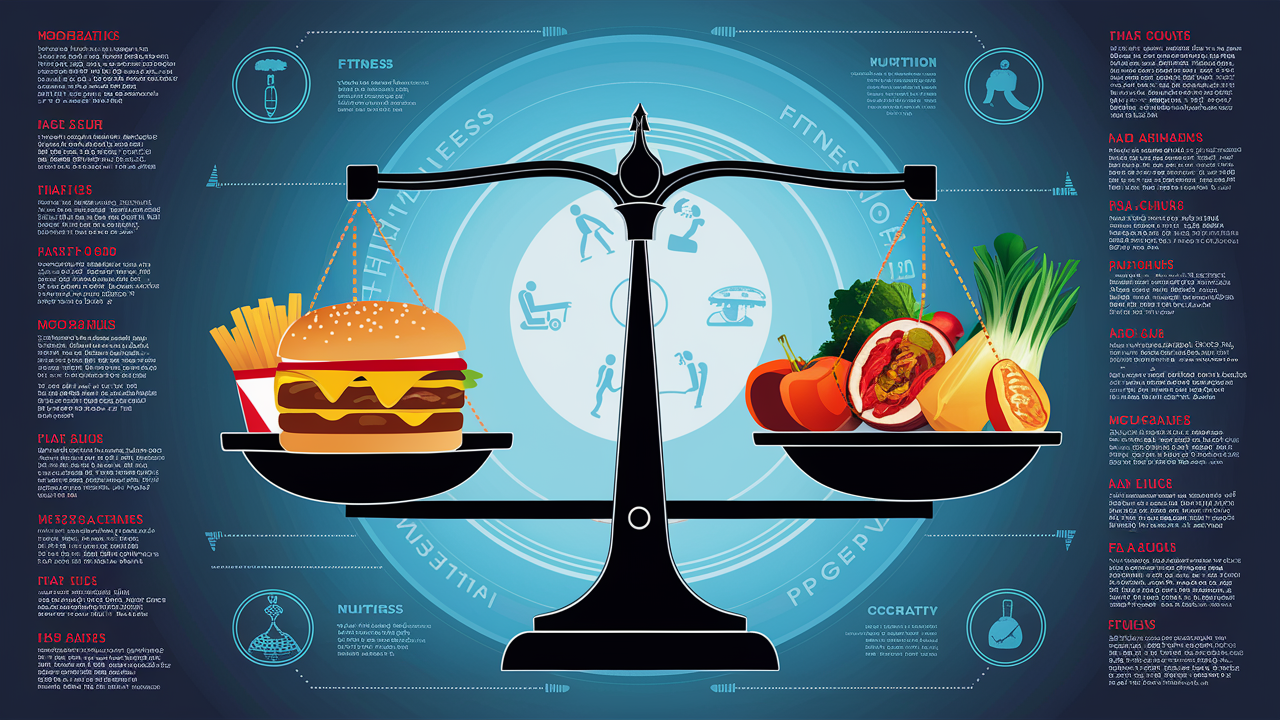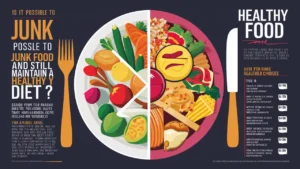- can we balance fast food with a healthy lifestyle? insights and practical advice
- Understanding the Impact of Fast Food on Health
- The Role of Moderation in a Balanced Diet
- Healthier Fast Food Options: Navigating the Menu
- Incorporating Physical Activity for Overall Well-being
- Can We Balance Fast Food with a Healthy Lifestyle? Insights and Practical Advice
- Mindful Eating: Savoring the Experience
- Building Sustainable Habits for Long-Term Success
- The Role of Support Systems in Healthy Living
- FAQ:
- Frequently Asked Questions: Can We Balance Fast Food with a Healthy Lifestyle? Insights and Practical Advice
can we balance fast food with a healthy lifestyle? insights and practical advice
Category: Healthy Eating, Nutrition
Tags: Trans Fats, Heart Health, Nutrition Facts, Healthy Fats, Omega-3, Essential Nutrients
In today’s fast-paced world, the allure of convenient and tasty fast food can often clash with the pursuit of a healthy lifestyle. However, the question remains: can we find a way to balance our occasional fast food cravings with the overall well-being of our bodies and minds? This article will explore insights and practical advice to help you navigate this delicate balance, ensuring you can enjoy the occasional indulgence without compromising your long-term health and wellness.
The modern American diet is heavily influenced by the prevalence of fast food, which often comes with a host of potential health concerns such as excess sodium, harmful trans fats, and added sugars. These nutritional pitfalls can contribute to a range of chronic diseases, including high blood pressure, heart disease, and obesity. However, with the right mindset and strategies, it is possible to incorporate fast food into a balanced diet and maintain a healthy lifestyle.
Throughout this article, we will delve into the impact of fast food on health, explore the role of moderation in a balanced diet, identify healthier fast food options, emphasize the importance of physical activity, and provide practical advice for building sustainable healthy habits. By the end, you’ll have a deeper understanding of how to find the right equilibrium between enjoying the occasional fast food indulgence and prioritizing your overall health and well-being.
Key Takeaways
- Fast food can be part of a healthy lifestyle when consumed in moderation and balanced with nutritious, whole-food choices.
- Understanding the nutritional profile of fast food, including hidden dangers like excess sodium, trans fats, and added sugars, is crucial for making informed decisions.
- Portion control and mindful eating strategies can help you enjoy fast food as an occasional treat without compromising your overall health.
- Incorporating physical activity into your routine can help counterbalance the potential negative effects of fast food consumption.
- Building sustainable healthy habits, such as meal planning and preparation, can make it easier to maintain a balanced diet that includes fast food in moderation.
Understanding the Impact of Fast Food on Health
As the fast food industry continues to thrive, it’s crucial to understand the significant impact it can have on our overall health. From the nutritional breakdown of popular fast food items to the hidden dangers lurking within, this section will delve deep into the potential risks associated with fast food consumption.
Nutritional Breakdown of Popular Fast Food Items
Many fast food menu items are laden with high amounts of calories, fat, sodium, and added sugars, all of which can contribute to a range of health risks if consumed in excess. A closer examination of the nutritional breakdown of these popular fast food choices reveals the potential negative health effects they can have, including weight gain, high blood pressure, and an increased risk of heart disease and obesity.
Hidden Dangers: Excess Sodium, Trans Fats, and Added Sugars
One of the most concerning aspects of fast food is the hidden dangers that often lurk within the ingredients. Excess sodium, harmful trans fats, and an abundance of added sugars are all too common in many fast food items, posing significant health risks to consumers. These hidden dangers can contribute to a range of potential health issues, from high blood pressure and heart disease to obesity and type 2 diabetes. Understanding the impact of fast food and the nutritional breakdown of these items is crucial for making informed food choices and maintaining a healthy lifestyle.
| Fast Food Item | Calories | Total Fat | Saturated Fat | Sodium | Added Sugars |
|---|---|---|---|---|---|
| McDonald’s Big Mac | 540 | 29g | 10g | 1,020mg | 9g |
| Burger King Whopper | 660 | 40g | 12g | 1,020mg | 12g |
| Taco Bell Crunchy Taco | 170 | 9g | 3g | 310mg | 1g |
| KFC Original Recipe Chicken Thigh | 320 | 21g | 5g | 800mg | 0g |
The data in the table above provides a clear nutritional breakdown of some popular fast food items, highlighting the high levels of calories, fat, sodium, and added sugars that are often present. This information can help readers understand the potential health risks associated with fast food consumption and make more informed food choices to support their overall health and well-being.
The Role of Moderation in a Balanced Diet
Achieving a balanced diet is essential for maintaining overall health and well-being, even when occasionally indulging in fast food. The role of moderation plays a crucial part in this equation, as it allows individuals to enjoy the occasional fast food treat while still prioritizing nutrient-dense choices. By adopting a balanced approach, you can savor the flavors of your favorite fast food items while ensuring your overall diet remains healthy and well-rounded.
Portion Control: Strategies for Mindful Eating
One of the key strategies for maintaining a balanced diet is portion control. When it comes to fast food, it’s easy to overindulge, leading to an imbalance in your overall caloric intake. By practicing mindful eating techniques, such as slowing down, savoring each bite, and being aware of your body’s hunger and fullness cues, you can learn to enjoy fast food in moderation without compromising your health. Incorporating portion control strategies can help you find the right balance between satisfying your cravings and maintaining a healthy diet.
Balancing Indulgences with Nutrient-Dense Choices
While fast food can be a tempting and convenient option, it’s important to balance these occasional indulgences with nutrient-dense choices. By prioritizing whole, unprocessed foods that are rich in essential vitamins, minerals, and fiber, you can ensure your body is receiving the necessary nutrients to support your overall health and well-being. This approach allows you to enjoy the occasional fast food meal while maintaining a balanced diet and healthy lifestyle habits.
Remember, the role of moderation in a balanced diet is not about completely eliminating fast food, but rather finding the right balance between enjoying it and making nutrient-dense choices. By adopting these strategies for mindful eating and balancing indulgences, you can maintain a balanced diet and healthy lifestyle while still savoring the occasional fast food treat.
Healthier Fast Food Options: Navigating the Menu
When it comes to indulging in the occasional fast food meal, the key is to make informed choices that align with a healthier lifestyle. By navigating fast food menus with a discerning eye, you can identify and opt for nutritious alternatives that satisfy your cravings without compromising your overall wellbeing.
Grilled vs. Fried: Making Smarter Protein Choices
One of the most impactful decisions you can make when dining at a fast food establishment is the type of protein you select. While fried options may be tempting, research suggests that choosing grilled or baked protein sources can significantly reduce your intake of unhealthy fats and calories. Look for menu items featuring grilled chicken, fish, or lean beef to maximize the nutritional value of your meal.
Swapping Fries for Salads and Veggies
Fast food menus often feature traditional sides like french fries, which can be high in calories, sodium, and unhealthy fats. To make a healthier choice, consider swapping out fries for a fresh salad or a side of steamed vegetables. These nutrient-dense options not only provide essential vitamins and minerals but can also help you feel more satisfied and energized throughout the day.
| Healthier Fast Food Alternatives | Traditional Fast Food Options |
|---|---|
| Grilled chicken sandwich | Fried chicken sandwich |
| Garden salad with grilled salmon | Large fries |
| Veggie burrito bowl | Cheeseburger and fries |
| Baked potato with broccoli and cheese | Onion rings |
By making mindful choices and prioritizing healthier fast food alternatives, you can enjoy the convenience of fast food while also maintaining a balanced and nutritious diet. Remember, with a little creativity and awareness, you can navigate fast food menus to find options that satisfy your cravings without compromising your overall health and wellness.
Incorporating Physical Activity for Overall Well-being
Maintaining a balanced lifestyle that includes occasional fast food consumption is not complete without the incorporation of regular physical activity. The importance of physical activity cannot be overstated, as it plays a crucial role in achieving overall well-being and counterbalancing the potential negative impacts of fast food.
Engaging in physical activity offers a multitude of benefits, from maintaining a healthy weight to improving cardiovascular health and boosting overall well-being. By striking a balance between fast food and physical activity, individuals can enjoy the convenience of fast food while actively maintaining an active lifestyle.
Regular exercise and healthy eating go hand-in-hand, creating a synergistic effect that optimizes positive health outcomes from physical activity. Incorporating a diverse range of physical activities, such as strength training, cardiovascular exercises, and flexibility routines, can help individuals maintain an active lifestyle and counteract the potential negative effects of occasional fast food consumption.
Ultimately, the role of physical activity in a healthy lifestyle is paramount. By embracing an active lifestyle and making conscious choices about fast food, individuals can achieve a well-rounded approach to their overall health and well-being.
Can We Balance Fast Food with a Healthy Lifestyle? Insights and Practical Advice
In our fast-paced world, the temptation of fast food is ever-present. While it can be convenient and satisfying, the long-term impact of excessive fast food consumption on our overall health and wellness is a growing concern. However, the good news is that with the right insights and practical advice, it is possible to balance fast food with a healthy lifestyle.
Understanding Nutritional Labels and Ingredient Lists
One of the key steps in making informed food choices when it comes to fast food is understanding the nutritional labels and ingredient lists. By carefully examining the information provided, you can identify the hidden dangers such as excess sodium, unhealthy trans fats, and added sugars that can contribute to various health risks. Armed with this knowledge, you can make wiser decisions and maintain optimal health even when indulging in the occasional fast food meal.
Choosing Whole, Unprocessed Foods for Optimal Health
While fast food can be a convenient option, the foundation of a balanced and healthy lifestyle lies in choosing whole, unprocessed foods. These nutrient-dense choices provide the essential vitamins, minerals, and fiber that our bodies need to thrive. By incorporating more whole, unprocessed foods into your diet, you can counterbalance the impact of fast food consumption and support your long-term health and well-being.
Remember, the key to balancing fast food with a healthy lifestyle is to approach it with moderation, mindfulness, and a focus on overall wellness. By understanding nutritional labels, reading ingredient lists, and choosing whole, unprocessed foods, you can make informed decisions and maintain a healthy lifestyle even when the convenience of fast food is tempting.
Mindful Eating: Savoring the Experience
In our fast-paced lives, it’s easy to rush through meals and miss out on the joys of mindful eating. However, taking the time to slow down and savor the food experience can not only enhance your appreciation for the flavors but also foster a more balanced approach to fast food consumption.
Slowing Down and Appreciating Your Food
When indulging in fast food, make a conscious effort to be present during your meals. Take a few deep breaths before you start eating, and allow yourself to truly appreciate the aromas, textures, and flavors of each bite. Avoid the temptation to multitask or engage with digital devices while eating, as this can distract you from fully savoring the food experience.
Adopting mindfulness techniques can help you develop a deeper connection with your food, even when enjoying the occasional fast food meal. Chew slowly, notice the different sensations in your mouth, and take the time to savor each morsel. This approach can lead to a more balanced and healthier relationship with fast food, allowing you to indulge in moderation while maintaining overall well-being.
By slowing down and appreciating your food, you’ll not only derive more pleasure from your meals but also be more conscious of your food consumption. This mindful approach can help you make informed decisions about when and how to incorporate fast food into your balanced lifestyle.
Building Sustainable Habits for Long-Term Success
Achieving a balanced lifestyle that incorporates the occasional fast food indulgence requires developing sustainable habits that can withstand the test of time. By focusing on meal planning and preparation as well as staying motivated and accountable, individuals can set themselves up for long-term success in maintaining a healthy lifestyle.
Meal Planning and Preparation for Busy Lifestyles
For those with busy lifestyles, the key to incorporating healthy eating habits lies in meal planning and preparation. By taking the time to plan out nutritious meals and snacks in advance, you can ensure that you have balanced options on hand, reducing the temptation to opt for fast food. Meal prepping can also save time and energy, making it easier to stick to a balanced diet even on the busiest of days.
Staying Motivated and Accountable
Maintaining long-term success with a balanced lifestyle requires a strong sense of motivation and accountability. Develop healthy routines and make lasting lifestyle changes by setting achievable goals, tracking your progress, and celebrating your successes. Surround yourself with a supportive network of friends and family who can help you stay motivated and overcome the temptation of fast food. With a practical approach and a positive mindset, you can build sustainable healthy habits that will serve you well in the long run.
The Role of Support Systems in Healthy Living
Achieving a balanced lifestyle that incorporates fast food in moderation can be greatly enhanced by the support of family and friends. Involving your loved ones in your health journey not only provides collective wellness, but also fosters a community-based approach to balanced living. Sharing your healthy lifestyle goals and encouraging each other can contribute significantly to your long-term success.
Building a robust support network is crucial when striving for a healthy lifestyle that includes occasional fast food consumption. Surrounding yourself with individuals who share your healthy living aspirations can motivate you to stay on track and provide the social support needed to navigate the challenges of maintaining a balanced diet. Together, you can share healthy lifestyle goals and encourage each other to make mindful choices, even when tempted by the convenience of fast food.
Involving Family and Friends in Your Journey
Engage your family and friends in your pursuit of a balanced approach to fast food and healthy living. Discuss your goals and strategies openly, and invite them to participate in your journey. Collaborating on meal planning, trying new nutrient-dense recipes, and encouraging each other to stay active can foster a sense of collective wellness and strengthen the community-based approach to balanced living. By drawing on the support and accountability of your loved ones, you’ll be better equipped to maintain a healthy lifestyle while occasionally indulging in fast food.
FAQ:
Frequently Asked Questions: Can We Balance Fast Food with a Healthy Lifestyle? Insights and Practical Advice
1. Can I include fast food in a balanced diet?
Yes, you can include fast food in moderation as part of a balanced diet. It’s important to make healthier food choices by selecting options that are lower in fat and sugar and higher in nutrients, such as salads, grilled chicken, or fruit sides. Opt for smaller portion sizes and avoid processed food and sugary drinks.
2. How can I balance fast food with a healthy lifestyle?
To balance fast food with a healthy lifestyle, focus on incorporating plenty of fruit and vegetables, whole grains, and lean proteins into your overall dietary intake. Be mindful of your food consumption, choose options with essential nutrients, and maintain physical activity to support overall health.
3. Are there health risks associated with consuming too much fast food?
Consuming excessive fast food, which is often high in fats, sugar, and calories, can increase the risk of chronic diseases like obesity, type 2 diabetes, and heart disease. It’s essential to balance fast food consumption with healthier options to reduce these risks.
4. How does fast food affect weight gain?
Fast food is typically high in calories and low in nutrients, making it easy to consume excess calories and contribute to weight gain. To maintain a healthy weight, it’s crucial to limit fast food intake, opt for healthier choices, and practice portion control.
5. Can fast food be a part of a balanced diet?
Fast food can be included in a balanced diet occasionally, but it should not be a primary source of nutrition. Incorporating fast food in small amounts while focusing on nutrient-dense foods like fruits, vegetables, and whole grains can help maintain a healthy diet.
Conclusion
As we reach the end of our exploration on balancing fast food with a healthy lifestyle, it’s clear that the key lies in finding the right balance. While the occasional indulgence in fast food can be part of an overall healthy diet, it’s crucial to be mindful of the potential impact on our overall wellness.
The practical advice shared throughout this article has highlighted the importance of understanding the nutritional breakdown of fast food, practicing portion control, and making informed choices when navigating fast food menus. By incorporating physical activity and developing sustainable healthy habits, we can effectively counterbalance the potential negative effects of fast food consumption and achieve long-term success in maintaining a balanced lifestyle.
Remember, the journey to a healthier you is not about depriving yourself, but rather about learning to incorporate fast food in moderation while prioritizing nutrient-dense, whole foods. With the right mindset and support systems, you can strike a harmonious balance between enjoying the convenience of fast food and cultivating a lifestyle that prioritizes your overall wellness. Embrace these key takeaways and embark on a path towards a sustainable, balanced approach to your food choices and overall well-being.


 5-minute snacks that costs cheap than a dollar and delight your taste buds
5-minute snacks that costs cheap than a dollar and delight your taste buds








June 12, 2024 at 1:16 pm[…] a well-balanced diet that includes a variety of nutrient-dense foods is essential for blood sugar control. By focusing on whole, unprocessed foods, we can provide our bodies with the necessary nutrients […]